Canada men's national volleyball team
The Canada men's national volleyball team represents Canada in international volleyball competitions. They are overseen by Volleyball Canada, the governing body for volleyball in Canada.
 | ||||||||||||||||||||||||||||||||||||||||||||||||||||||||||||||||||||||||||||||||||||||||||||||||||||||||||||||||||
| Association | Volleyball Canada | |||||||||||||||||||||||||||||||||||||||||||||||||||||||||||||||||||||||||||||||||||||||||||||||||||||||||||||||||
|---|---|---|---|---|---|---|---|---|---|---|---|---|---|---|---|---|---|---|---|---|---|---|---|---|---|---|---|---|---|---|---|---|---|---|---|---|---|---|---|---|---|---|---|---|---|---|---|---|---|---|---|---|---|---|---|---|---|---|---|---|---|---|---|---|---|---|---|---|---|---|---|---|---|---|---|---|---|---|---|---|---|---|---|---|---|---|---|---|---|---|---|---|---|---|---|---|---|---|---|---|---|---|---|---|---|---|---|---|---|---|---|---|---|---|
| Confederation | NORCECA | |||||||||||||||||||||||||||||||||||||||||||||||||||||||||||||||||||||||||||||||||||||||||||||||||||||||||||||||||
| Head coach | Tuomas Sammelvuo | |||||||||||||||||||||||||||||||||||||||||||||||||||||||||||||||||||||||||||||||||||||||||||||||||||||||||||||||||
| FIVB ranking | 13 (as of 15 September 2023) | |||||||||||||||||||||||||||||||||||||||||||||||||||||||||||||||||||||||||||||||||||||||||||||||||||||||||||||||||
| Uniforms | ||||||||||||||||||||||||||||||||||||||||||||||||||||||||||||||||||||||||||||||||||||||||||||||||||||||||||||||||||
| ||||||||||||||||||||||||||||||||||||||||||||||||||||||||||||||||||||||||||||||||||||||||||||||||||||||||||||||||||
| Summer Olympics | ||||||||||||||||||||||||||||||||||||||||||||||||||||||||||||||||||||||||||||||||||||||||||||||||||||||||||||||||||
| Appearances | 5 (First in 1976) | |||||||||||||||||||||||||||||||||||||||||||||||||||||||||||||||||||||||||||||||||||||||||||||||||||||||||||||||||
| Best result | 4th (1984) | |||||||||||||||||||||||||||||||||||||||||||||||||||||||||||||||||||||||||||||||||||||||||||||||||||||||||||||||||
| World Championship | ||||||||||||||||||||||||||||||||||||||||||||||||||||||||||||||||||||||||||||||||||||||||||||||||||||||||||||||||||
| Appearances | 12 (First in 1974) | |||||||||||||||||||||||||||||||||||||||||||||||||||||||||||||||||||||||||||||||||||||||||||||||||||||||||||||||||
| Best result | 7th (2014) | |||||||||||||||||||||||||||||||||||||||||||||||||||||||||||||||||||||||||||||||||||||||||||||||||||||||||||||||||
| World Cup | ||||||||||||||||||||||||||||||||||||||||||||||||||||||||||||||||||||||||||||||||||||||||||||||||||||||||||||||||||
| Appearances | 5 (First in 1977) | |||||||||||||||||||||||||||||||||||||||||||||||||||||||||||||||||||||||||||||||||||||||||||||||||||||||||||||||||
| Best result | 7th (2003, 2015) | |||||||||||||||||||||||||||||||||||||||||||||||||||||||||||||||||||||||||||||||||||||||||||||||||||||||||||||||||
| NORCECA Championship | ||||||||||||||||||||||||||||||||||||||||||||||||||||||||||||||||||||||||||||||||||||||||||||||||||||||||||||||||||
| Appearances | 28 (First in 1969) | |||||||||||||||||||||||||||||||||||||||||||||||||||||||||||||||||||||||||||||||||||||||||||||||||||||||||||||||||
| Best result | ||||||||||||||||||||||||||||||||||||||||||||||||||||||||||||||||||||||||||||||||||||||||||||||||||||||||||||||||||
| Volleyball.ca | ||||||||||||||||||||||||||||||||||||||||||||||||||||||||||||||||||||||||||||||||||||||||||||||||||||||||||||||||||
Honours
| ||||||||||||||||||||||||||||||||||||||||||||||||||||||||||||||||||||||||||||||||||||||||||||||||||||||||||||||||||
The team placed fourth place at the 1984 Olympic Games in Los Angeles and three bronze medals at the Pan American Games in 1979, 1999 and 2015. They have participated in four Olympic Games, including most recently a fifth-place finish at Rio 2016, after returning to the Games following a quarter-century absence. Canada hosted the 2015 Pan American Games in Toronto where they beat Puerto Rico for the bronze medal. Canada competed at the FIVB Volleyball Men's World Cup in 2015 for the first time in 12 years, finishing seventh. They last appeared in 2003, also finishing seventh. They finished joint-seventh at the 2014 FIVB Volleyball Men's World Championship.
History
Early years
In 1953, the Canadian Volleyball Association (CVA) was formed, joining FIVB the same year. That year, the first national volleyball championship was held as well. Canada's first appearance at a major international competition was at the 1959 Pan American Games, held in Chicago.[1] Canada finished 6th in the tournament, after finishing 3rd in their group and failing to advance to the final group.[2] In 1968, Canada joined NORCECA, two years after it was formed. They competed in their first NORCECA championship in 1969, finishing 4th.
1970s
In 1973, at their second NORCECA championship, Canada won the bronze medal. A year later, they competed at their first FIVB World Championships, in Mexico. Canada finished last in their group in the first round, losing all three matches in straight sets. In the classification round, they finished 3rd, finishing below both Tunisia and the United States. In the final classification round, Canada finished 2nd in the group, placing them 20th overall in the tournament.[3]
Canada qualified for their first-ever Olympic tournament in 1976 as hosts. They finished bottom of their group in the group stage, losing in straight sets in every match, and ending up in 9th place overall.[4] The next year, Canada appointed Ken Maeda as the head coach, and in the team's first competition under him, they won bronze at the 1977 NORCECA Championship. In 1978, Canada finished 20th out of 24 teams at the World Championships. At the 1979 Pan American games, Canada won bronze, winning five matches while losing two in the tournament.
1980s
At the 1981 NORCECA championship, Canada finished 3rd, beating Mexico in the bronze medal match. The next year, Canada competed in their 3rd FIVB World Championship, held in Argentina. They finished top of their group in the first round, ahead of East Germany and Italy on their set ratio. In the second group round, Canada finished 5th in their group, knocking them out of medal contention and ranking them 11th place in the tournament. The following year at the 1983 NORCECA Championships, they won the silver medal, finishing below the United States.
In 1984, Canada competed at the Olympic Games for the second time in their history. They finished top of their group ahead of Italy and Japan on their set ratio in the group stage, advancing them to their first Olympic semi-final appearance. They met the United States in the semis, losing in straight sets, sending them to the bronze medal match where they lost to Italy again. Their 4th place finish at the tournament stands as their highest ever Olympic finish.
Canada finished 3rd at the NORCECA Championship in 1985 and 1987, and finished 2nd at the 1989 NORCECA Championship while failing to qualify for the 1986 FIVB World Championships.
1990s
Canada competed at the 1990 FIVB World Championships in Brazil, finishing 3rd in their group in the group stage. In the round of 16, Canada lost to France in four sets, sending them to the classification bracket, where they lost in five sets to both Czechoslovakia and Japan. Canada finished the tournament in 12th place. The next year, Canada competed in the FIVB World League for the first time. They finished bottom of their group with 18 points over 16 games and finished the tournament in last place. That same year, Canada hosted the NORCECA Championship for the first time, with the tournament taking place in Regina. Canada finished 3rd in the tournament, and qualified for the 1992 Summer Olympics in Barcelona. At the Olympics, they finished 5th in their group, failing to make it to the quarterfinals and finishing the tournament in last place.
In 1993, Canada finished in 3rd place at the NORCECA Championship, beating Puerto Rico in the bronze medal match. At the 1994 FIVB World Championships, Canada lost out in the round of 16 after finishing 3rd in their group, finishing the tournament tied for 9th place. At both the 1995 and 1997 NORCECA Championships, Canada finished with bronze, beating Puerto Rico and Mexico in both respective bronze medal matches. At the 1998 FIVB World Championship, Canada began the tournament finishing 3rd in their group in the first round. In the second group round, Canada finished 5th in their group, failing to make it to the semi-finals. Canada finished the tournament in 12th place, losing to Ukraine and Argentina in the classification matches.
Canada returned to World League in 1999 for the first time since 1992, finishing in 8th place. At the NORCECA Championship, Canada finished with bronze, beating Mexico in the bronze medal match in five sets. Canada also won bronze in the 1999 Pan American Games in Winnipeg, beating Argentina in their final match.
2000s
In the 2000 World League season, Canada finished in 11th place. The next year, at the 2001 NORCECA Championship, they finished with bronze, beating Dominicana in their final match. At the 2002 FIVB World Championship, Canada finished 3rd in the first group stage but did not advance to the second group round. They finished 17th overall in the tournament. In 2003, Canada finished with a silver medal at the NORCECA Championship, losing to the United States in the final, and in 2005 they finished with a bronze medal in the same tournament. In 2006, Canada competed in the FIVB World Championship held in Japan. They began the tournament finishing 3rd in their group, advancing past the preliminaries to the main round. There, they placed 6th in their group, knocking them out of medal contention. In the classification matches, Canada lost to the United States in 5 sets but beat Puerto Rico in 4 sets to place 11th overall in the competition. The following year, Canada placed 13th in World League, after finishing bottom of their group with two wins in 12 matches. In the 2007 and 2009 editions of the NORCECA Championship, Canada were held off of the podium for the first time since 1975, finishing in 4th place both years.
2010–2016
At the 2010 FIVB World Championship, Canada finished tied for 19th, losing out in the first group round. The following year Canada competed in World League again, placing 12th overall. The same year, Canada won bronze at the NORCECA Championship, beating Puerto Rico in the deciding match. Canada finished 5th overall in the 2013 World League season, and later that year Canada finished with silver in the NORCECA Championship, losing to the United States in the final.
In 2014, Canada competed in the FIVB World Championship in Poland. Canada opened the tournament with a loss in straight sets to Russia before beating Bulgaria in five sets. Canada then went on to beat the remaining teams in the group all in straight sets to claim the second-ranked spot in the group, advancing to the second round. Canada started the second round off well, beating Cuba in 5 sets before defeating Finland in three straight. However, following two straight-set losses to Brazil and Germany, Canada finished fourth in the group and did not advance to the third round. Canada's finished the world championship in 7th place, a record for the national team.
In 2015, Canada hosted the Pan American Games. At the tournament, Canada finished top of their group, advancing to the semifinals. There they faced Argentina, and lost in four sets, sending Canada to the bronze medal match to face Puerto Rico. They were successful and defeated them in four sets, winning Canada's 3rd Pan-American bronze medal.
In the 2016 World League season, Canada finished top of Group 2, advancing to the Final Round. In the Final Round, they beat Turkey in the semifinals in three sets, and defeated Portugal in the final in three straight. This win qualified Canada for Group 1 in the 2017 World League for the first time. Following the successful World League campaign, Canada competed in the Olympic Qualifiers. Canada began the tournament with two five-set losses to Poland and Iran, before beating Australia in five sets. Canada then went on to beat Venezuela before falling to France in straight sets. They then closed out the tournament with back-to-back wins over Japan and China, in four and five sets respectively. This was good enough for a 4th place finish in the tournament, qualifying Canada for their first Olympics in 24 years.
At the 2016 Summer Olympics, Canada started out strongly, beating USA in three straight sets. However, they failed to defeat the host Brazil, falling to them in four sets, while following that match up with a straight-set loss to France in their 3rd group match. In their 4th match, Canada defeated Mexico in four sets, setting up a must-win final group stage match against Italy. Canada beat Italy in four sets, led by Gavin Schmitt's match-high 23 points. This result placed Canada 2nd in their group and set up a quarterfinal matchup against Russia. However, they were unable to advance past the Russians, losing in three straight sets. Canada finished the tournament in 5th place, their highest Olympic finish since 1984.
2017–present
Following Glenn Hoag's retirement as head coach, Stephane Antiga was hired as Hoag's successor.[5] At the 2017 World League, Canada played with a much younger team than was on display at the Olympics the previous year. With the retirements of many leaders within the squad, Antiga looked to younger talent such as Ryley Barnes and Sharone Vernon-Evans to step up and contribute. Canada began their 2017 World League with a strong first week, beating both Belgium and the reigning Olympic Bronze medalists USA in five sets, while losing to Serbia. In week two, Canada won three points against Bulgaria, while losing their other two matches in four sets. In the final week, Canada beat Belgium and Italy, gaining 5 out of a possible 9 points for the week, which was enough for them to finish in 5th place and qualify for the final round.
Canada lost their first match of the final round to the host Brazilians, before defeating the Russians in straight sets, sending Canada to the semi-finals. There they met France and lost in four sets. In the bronze medal match, Canada faced USA, and after losing the first set Canada went on to win three straight and claim their first-ever World League medal. At the conclusion of the tournament, both Graham Vigrass and Blair Bann were selected as tournament all-stars.
Competitive record

Olympic Games
Champions Second place Third place
| Summer Olympics record | |||||||
|---|---|---|---|---|---|---|---|
| Year | Round | Position | GP | MW | ML | SW | SL |
| did not qualify | |||||||
| Preliminary Round | 9th | 4 | 0 | 4 | 0 | 12 | |
| Boycott | |||||||
| Semifinals | 4th | 6 | 3 | 3 | 10 | 9 | |
| did not qualify | |||||||
| 9th–10th places | 10th | 6 | 1 | 5 | 11 | 15 | |
| did not qualify | |||||||
| Quarterfinals | 5th | 6 | 3 | 3 | 10 | 10 | |
| Quarterfinals | 8th | 6 | 2 | 4 | 9 | 12 | |
| Qualified | |||||||
| Total | 0 Titles | 5/15 | 28 | 9 | 19 | 40 | 58 |
| Olympic Games rosters | ||
|---|---|---|
| Year | Roster | |
| 1976 Montreal | Alexiuk, Belanger, Graham, Klostermann, Michalski, Paulsen, Pischke, Plenert, Prasil, Romanchych, Russell, Taylor. Head coach: Neville | |
| 1984 Los Angeles | Bacon, Barrett, Coulter, Danyluk, Gratton, Hoag, Tom Jones, Dave Jones, Ketrzynski, Pischke, Saxton, Wagner. Head Coach: Maeda | |
| 1992 Barcelona | Albert, Boyles, Brousseau, Coulter, Frehlick, Gagnon, Gingera, Greves, Knight, Paddock, Williscroft, Willock. Head Coach: Watson | |
| 2016 Rio | Bann, Blankenau, Duff, Hoag, Jansen Van Doorn, Marshall, Perrin, Sanders, Schmitt, Verhoeff, Vigrass, Winters. Head Coach: Hoag | |
| 2020 Tokyo | Sanders, Perrin, Marshall, Hoag, Maar, Blankenau, Sclater, Van Berkel, Vernon-Evans, Vigrass, Bann, Szwarc. Head coach: Hoag | |
World Championship
Champions Second place Third place
| World Championship record | |||||||
|---|---|---|---|---|---|---|---|
| Year | Round | Position | GP | MW | ML | SW | SL |
| did not participate | |||||||
| did not qualify | |||||||
| 19th–24th places | 20th | 10 | 5 | 5 | 18 | 20 | |
| 17th–20th places | 20th | 9 | 3 | 6 | 12 | 18 | |
| 9th–12th places | 11th | 9 | 4 | 5 | 16 | 18 | |
| did not qualify | |||||||
| 9th–12th places | 12th | 6 | 1 | 5 | 3 | 16 | |
| Final Round | 9th | 4 | 1 | 3 | 5 | 9 | |
| 9th–12th places | 12th | 12 | 4 | 8 | 15 | 28 | |
| First Round | 17th | 3 | 1 | 2 | 4 | 7 | |
| 9th–12th places | 11th | 11 | 5 | 6 | 18 | 24 | |
| First Round | 19th | 3 | 1 | 2 | 3 | 7 | |
| Second Round | 7th | 9 | 6 | 3 | 18 | 13 | |
| Second Round | 9th | 8 | 5 | 3 | 18 | 14 | |
| First Round | 17th | 3 | 1 | 2 | 3 | 6 | |
| Qualified | |||||||
| Total | 0 Titles | 13/21 | 87 | 37 | 50 | 133 | 180 |
World Cup
Champions Second place Third place
| World Cup record | |||||||
|---|---|---|---|---|---|---|---|
| Year | Round | Position | GP | MW | ML | SW | SL |
| did not participate | |||||||
| Final Group | 12th | 5 | 0 | 5 | 3 | 15 | |
| did not participate | |||||||
| Round Robin | 9th | 11 | 3 | 8 | 11 | 27 | |
| Round Robin | 8th | 11 | 5 | 6 | 17 | 24 | |
| Round Robin | 7th | 11 | 5 | 6 | 18 | 23 | |
| did not participate | |||||||
| Round Robin | 7th | 11 | 5 | 6 | 18 | 22 | |
| Round Robin | 9th | 11 | 4 | 7 | 19 | 28 | |
| Total | 0 Titles | 6/14 | 60 | 22 | 38 | 86 | 139 |
| World Cup rosters | ||
|---|---|---|
| Year | Roster | |
| 2003 Japan | Ballard, Brinkman, Bruce, Duerden, Grapentine, Haldane, Koskie, Ruette, Snider, Winters, Wolfenden, Brett Youngberg. Head Coach: DeRocco | |
| 2015 Japan | Bann, Duff, Hoag, Jansen Van Doorn, Lewis, Marshall, Perrin, Sanders, Schmitt, Schneider, Van Lankvelt, Verhoeff, Vigrass, Winters. Head Coach: Hoag | |
| 2019 Japan | Marshall, Hoag, Barnes, Maar, DeRocco, Vernon-Evans, Jansen Van Doorn, Van Berkel, Keturakis, Bann, Szwarc, Walsh, Scheerhoorn, Demyanenko Head coach: Lewis | |
Nations League
Champions Second place Third place
| Nations League record | ||||||||
|---|---|---|---|---|---|---|---|---|
| Year | Round | Position | GP | MW | ML | SW | SL | Squad |
| Preliminary round | 7th | 15 | 8 | 7 | 29 | 24 | Squad | |
| Preliminary round | 9th | 15 | 8 | 7 | 29 | 29 | Squad | |
| Preliminary round | 8th | 15 | 7 | 8 | 27 | 26 | Squad | |
| Preliminary round | 15th | 12 | 2 | 10 | 10 | 33 | Squad | |
| Preliminary round | 12th | 12 | 3 | 9 | 15 | 31 | Squad | |
| Total | 0 Titles | 5/5 | 69 | 28 | 41 | 110 | 143 | — |
| Nations League rosters | ||
|---|---|---|
| Year | Roster | |
| 2018 Lille | Sanders, Gordon Perrin, Marshall, Hoag, Van Berkel, Duff, Maar, Blankenau, DeRocco, Jansen Van Doorn, Schmitt, Barnes, Duquette, Joseph Sclater, Vigrass, Gunter, Bann, Szwarc, Walsh, Demyanenko, Loeppky Head coach: Antiga | |
| 2021 Rimini | Sanders, Gordon Perrin, Marshall, Hoag, Pereira, Maar, Blankenau, Sclater, Jansen Van Doorn, Van Berkel, Vernon-Evans, Loeppky, Vigrass, Bann, Szwarc, Walsh, Demyanenko Head coach: Hoag | |
World League
 1990 Osaka — did not participate
1990 Osaka — did not participate 1991 Milan — 10th place
1991 Milan — 10th place 1992 Genoa — 7th place
1992 Genoa — 7th place 1993 São Paulo — did not participate
1993 São Paulo — did not participate 1994 Milan — did not participate
1994 Milan — did not participate 1995 Rio de Janeiro — did not participate
1995 Rio de Janeiro — did not participate 1996 Rotterdam — did not participate
1996 Rotterdam — did not participate 1997 Moscow — did not participate
1997 Moscow — did not participate 1998 Milan — did not participate
1998 Milan — did not participate 1999 Mar del Plata — 8th place
1999 Mar del Plata — 8th place 2000 Rotterdam — 11th place
2000 Rotterdam — 11th place 2001 Katowice — did not participate
2001 Katowice — did not participate 2002 Belo Horizonte — did not participate
2002 Belo Horizonte — did not participate 2003 Madrid — did not participate
2003 Madrid — did not participate 2004 Rome — did not participate
2004 Rome — did not participate.svg.png.webp) 2005 Belgrade — did not participate
2005 Belgrade — did not participate 2006 Moscow — did not participate
2006 Moscow — did not participate 2007 Katowice — 13th place¹
2007 Katowice — 13th place¹
 2008 Rio de Janeiro — did not participate
2008 Rio de Janeiro — did not participate 2009 Belgrade — did not participate
2009 Belgrade — did not participate 2010 Córdoba — did not participate
2010 Córdoba — did not participate 2011 Gdańsk — did not participate
2011 Gdańsk — did not participate 2012 Sofia — 12th place¹
2012 Sofia — 12th place¹
 2013 Mar del Plata — 5th place
2013 Mar del Plata — 5th place
 2014 Florence — 13th place¹
2014 Florence — 13th place¹
 2015 Rio de Janeiro — 15th place¹
2015 Rio de Janeiro — 15th place¹
 2016 Kraków — 13th place
2016 Kraków — 13th place
 2017 Curitiba —
2017 Curitiba —  Bronze medal
Bronze medal
¹ players during all matches of intercontinental round
NORCECA Championship
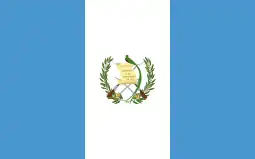 1969 Mazatenango — 4th place
1969 Mazatenango — 4th place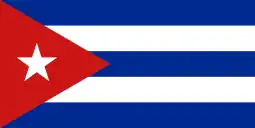 1971 Havana — did not qualify
1971 Havana — did not qualify 1973 Tijuana —
1973 Tijuana —  Bronze medal
Bronze medal 1975 Los Angeles — 4th place
1975 Los Angeles — 4th place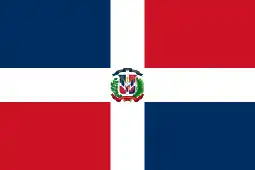 1977 Santo Domingo —
1977 Santo Domingo —  Bronze medal
Bronze medal 1979 Havana —
1979 Havana —  Silver medal
Silver medal 1981 Mexico City —
1981 Mexico City —  Bronze medal
Bronze medal 1983 Indianapolis —
1983 Indianapolis —  Silver medal
Silver medal 1985 Santiago —
1985 Santiago —  Bronze medal
Bronze medal 1987 Havana —
1987 Havana —  Bronze medal
Bronze medal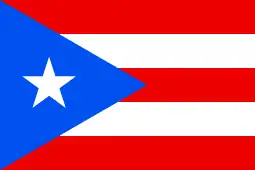 1989 San Juan —
1989 San Juan —  Silver medal
Silver medal.svg.png.webp) 1991 Regina —
1991 Regina —  Bronze medal
Bronze medal 1993 New Orleans —
1993 New Orleans —  Bronze medal
Bronze medal.svg.png.webp) 1995 Edmonton —
1995 Edmonton —  Bronze medal
Bronze medal 1997 Caguas —
1997 Caguas —  Bronze medal
Bronze medal 1999 Monterrey —
1999 Monterrey —  Bronze medal
Bronze medal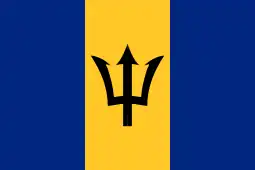 2001 Bridgetown —
2001 Bridgetown —  Bronze medal
Bronze medal 2003 Culiacán —
2003 Culiacán —  Silver medal
Silver medal.svg.png.webp) 2005 Winnipeg —
2005 Winnipeg —  Bronze medal
Bronze medal 2007 Anaheim — 4th place
2007 Anaheim — 4th place 2009 Bayamón — 4th place
2009 Bayamón — 4th place 2011 Mayaguez —
2011 Mayaguez —  Bronze medal
Bronze medal.svg.png.webp) 2013 Langley —
2013 Langley —  Silver medal
Silver medal 2015 Córdoba —
2015 Córdoba —  Gold medal
Gold medal
 2017 Colorado Springs —
2017 Colorado Springs —  Bronze medal
Bronze medal.svg.png.webp) 2019 Winnipeg —
2019 Winnipeg —  Bronze medal
Bronze medal 2021 Durango City —
2021 Durango City —  Silver medal
Silver medal 2023 Charleston —
2023 Charleston —  Silver medal
Silver medal
Pan American Games
 1955 Mexico City — did not participate
1955 Mexico City — did not participate 1959 Chicago — 6th place
1959 Chicago — 6th place.svg.png.webp) 1963 São Paulo — 8th place
1963 São Paulo — 8th place.svg.png.webp) 1967 Winnipeg — 6th place
1967 Winnipeg — 6th place 1971 Cali — 9th place
1971 Cali — 9th place 1975 Mexico City — 6th place
1975 Mexico City — 6th place 1979 San Juan —
1979 San Juan —  Bronze medal
Bronze medal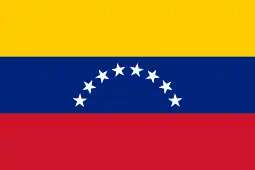 1983 Caracas — 5th place
1983 Caracas — 5th place 1987 Indianapolis — 5th place
1987 Indianapolis — 5th place 1991 Havana — 6th place
1991 Havana — 6th place 1995 Mar del Plata — 5th place
1995 Mar del Plata — 5th place.svg.png.webp) 1999 Winnipeg —
1999 Winnipeg —  Bronze medal
Bronze medal 2003 Santo Domingo — 5th place
2003 Santo Domingo — 5th place 2007 Rio de Janeiro — 7th place
2007 Rio de Janeiro — 7th place
 2011 Guadalajara — 6th place
2011 Guadalajara — 6th place
.svg.png.webp) 2015 Toronto —
2015 Toronto —  Bronze medal
Bronze medal
Pan-American Cup
 2006 Mexicali & Tijuana —
2006 Mexicali & Tijuana —  Bronze medal
Bronze medal 2007 Santo Domingo — 4th place
2007 Santo Domingo — 4th place.svg.png.webp) 2008 Winnipeg —
2008 Winnipeg —  Silver medal
Silver medal 2009 Chiapas —
2009 Chiapas —  Silver medal
Silver medal 2010 San Juan — 5th place
2010 San Juan — 5th place.svg.png.webp) 2011 Gatineau —
2011 Gatineau —  Bronze medal
Bronze medal 2012 Santo Domingo — 6th place
2012 Santo Domingo — 6th place 2013 Mexico City — did not participate
2013 Mexico City — did not participate 2014 Tijuana — 7th place
2014 Tijuana — 7th place 2015 Reno — 4th place
2015 Reno — 4th place 2016 Mexico City —
2016 Mexico City —  Bronze medal
Bronze medal.svg.png.webp) 2017 Gatineau — 4th place
2017 Gatineau — 4th place 2018 Córdoba — 6th place
2018 Córdoba — 6th place 2019 Colima City — 7th place
2019 Colima City — 7th place 2021 Santo Domingo —
2021 Santo Domingo —  Silver medal
Silver medal.svg.png.webp) 2022 Gatineau —
2022 Gatineau —  Silver medal
Silver medal
America's Cup
 1998 Mar del Plata — 6th place
1998 Mar del Plata — 6th place 1999 Tampa — 5th place
1999 Tampa — 5th place 2000 São Bernardo — 5th place
2000 São Bernardo — 5th place 2001 Buenos Aires — 6th place
2001 Buenos Aires — 6th place 2005 São Leopoldo — 5th place
2005 São Leopoldo — 5th place 2007 Manaus — 5th place
2007 Manaus — 5th place 2008 Cuiabá — did not participate
2008 Cuiabá — did not participate
Team
Current roster
The following is the Canadian roster for the 2022 FIVB Volleyball Men's World Championship.[6]
Head coach: ![]() Benjamin Josephson
Benjamin Josephson
| No. | Name | Date of birth | Height | Spike | Block | 2022–23 club |
|---|---|---|---|---|---|---|
| 3 | Derek Epp | 15 June 1998 | 2.01 m (6 ft 7 in) | 345 cm (136 in) | 320 cm (130 in) | |
| 4 | Nicholas Hoag (C) | 19 August 1992 | 2.00 m (6 ft 7 in) | 350 cm (140 in) | 323 cm (127 in) | |
| 7 | Stephen Maar | 6 December 1994 | 2.02 m (6 ft 8 in) | 358 cm (141 in) | 329 cm (130 in) | |
| 8 | Brett Walsh | 19 February 1994 | 1.96 m (6 ft 5 in) | 347 cm (137 in) | 315 cm (124 in) | |
| 10 | Ryan Sclater | 10 February 1994 | 2.00 m (6 ft 7 in) | 353 cm (139 in) | 320 cm (130 in) | |
| 11 | Pearson Eshenko | 16 October 1997 | 2.04 m (6 ft 8 in) | 363 cm (143 in) | 340 cm (130 in) | |
| 12 | Lucas Van Berkel | 29 November 1991 | 2.10 m (6 ft 11 in) | 350 cm (140 in) | 326 cm (128 in) | |
| 17 | Ryley Barnes | 11 October 1993 | 2.00 m (6 ft 7 in) | 352 cm (139 in) | 325 cm (128 in) | |
| 19 | Brodie Hofer | 27 April 2000 | 2.00 m (6 ft 7 in) | 358 cm (141 in) | 330 cm (130 in) | |
| 20 | Arthur Szwarc | 30 March 1995 | 2.09 m (6 ft 10 in) | 360 cm (140 in) | 337 cm (133 in) | |
| 21 | Jackson Howe | 16 June 1998 | 1.98 m (6 ft 6 in) | 356 cm (140 in) | 335 cm (132 in) | |
| 22 | Steven Marshall | 23 November 1989 | 1.94 m (6 ft 4 in) | 350 cm (140 in) | 322 cm (127 in) | |
| 24 | Mathias Elser | 3 June 2001 | 1.98 m (6 ft 6 in) | 353 cm (139 in) | 325 cm (128 in) | |
| 80 | Eric Loeppky | 1 August 1998 | 1.95 m (6 ft 5 in) | 355 cm (140 in) | 325 cm (128 in) |
Coaching staff
| Name | Position |
|---|---|
| Head coach | |
| Assistant coach | |
| Assistant coach | |
| Statistician | |
| Athletic Therapist | |
| Doctor | |
| Strength Coach | |
| Strength Coach | |
| Mental Performance Coach | |
| General manager |
Coach history
| Name | From | To |
|---|---|---|
| 1972 | 1977 | |
| 1977 | 1984 | |
| 1985 | 1992 | |
| 1992 | 1996 | |
| 1996 | 2000 | |
| 2001 | 2006 | |
| 2006 | 2016 | |
| 2017 | 2018 | |
| 2019 | 2022 | |
| 2022 | ||
Kit provider
The table below shows the history of kit providers for the Canada national volleyball team.
| Period | Kit provider |
|---|---|
| 2000– | Mizuno |
Sponsorship
Primary sponsors include: main sponsors like Inter Pipeline other sponsors: Lululemon Athletica, Wilson Sporting Goods and UNIGLOBE Travel International.
References
- "Indoor Volleyball History". Volleyball.ca. Retrieved 19 August 2017.
- Krastev, Todor. "Men Volleyball Panamerican Games 1959 Chicago (USA) – 28.08-05.09 Winner United States". Todor66. Retrieved 19 August 2017.
- Krastev, Todor. "Men Volleyball VIII World Championship 1974 Mexico City (MEX) – 12-28.10 – Winner Poland". Todor66. Retrieved 19 August 2017.
- Krastev, Todor. "Men Volleyball XXI Olympic Games Montreal (CAN) 1976 – 18-30.07 Winner Poland". Todor66. Retrieved 19 August 2017.
- The Canadian Press. "Antiga named coach of Canadian men's volleyball team". CBC. Retrieved 19 August 2017.
- Daily Bulletin Slovenia